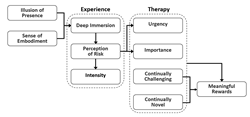
Currently, neurorehabilitation for stroke survivors results in fewer than 10 percent resuming an active, independent lifestyle. This is where Torque3 can make a profound difference. Nothing like this stroke rehabilitation system exists anywhere.
CENTERVILLE, Utah (PRWEB)
June 01, 2022
Torque3, the company developing a rehabilitation solution for stroke and TBI survivors, announced today that the principal therapeutic factor in its intense, deeply immersive neurorehabilitation platform is Task‐Oriented Therapy Plus, or TOT+ (patent pending).
One of the most common approaches to restoring function after a stroke or TBI is called Task-Oriented Training (or Task-Oriented Therapy), or “TOT” for short. This type of therapy focuses on recovering impaired functionality and is used primarily by Occupational and Physical Therapists. This type of training generally focuses on isolated motor functions including fine motor activities. However, it may also encompass the tasks of complex movement, navigation within the environment, and large-scale activities. Several principles of TOT are required for successful rehabilitation; they are:
-
Activation of specific brain regions corresponding to the injury - Adequate repetition
- Adequate intensity
- Activities are novel and challenging
- Active problem solving
- Offers meaningful rewards
Substantial research is now demonstrating that using both Virtual Reality and Robotics can enhance these principles.
The Torque3 platform utilizes a collection of technologies, all to deliver the best task-oriented therapy possible. Torque3’s unique approach to task-orientated therapy not only uses multiple methods to improve on current TOT best practices but has expanded considerably upon the fundamentals of how the task-oriented therapy should be performed by adding key new characteristics that increase effectiveness. These technologies include deeply immersive and responsive virtual simulations and advanced robotics, both with integrated and synchronized machine learning.
Deep immersion combined with multi-modal integration of cognitive and physical systems are believed to enhance neuroplasticity. In addition to improving neuroplasticity, research suggests that a transfer of training from the virtual world to the physical world is increased if deep immersion is maximized. So, anything that can achieve deep immersion should improve rehabilitation treatment outcomes. The Torque3 platform does that plus much more.
Fundamental to achieving deep immersion are “presence” and “embodiment”. Presence is considered the subjective feeling of being present in a simulated environment. In contrast, the sense of embodiment is how we experience ourselves inside a body that interacts continuously with the virtual environment. The combination of presence and embodiment facilitates a state of deep immersion, where riders suspend their disbelief, which allows a “perception of risk” to be created in a safe, controlled environment. This provides two very important capabilities. First, it adds intensity to the overall experience, which unto itself can improve neuroplasticity, but more importantly, the perception of risk causes the brain to assign urgency and importance to all the actions performed during task-oriented therapy.
The introduction of risk engages multiple brain regions and neurotransmitter systems that enhance neuroplastic healing, deepens the experience of embodied presence, and maximizes positive psychological states associated with improved immersive experiences. It also fosters a greater sense of self-efficacy, confidence, a feeling of wholeness, and decreased levels of demoralization.
Torque3’s hypothesis is that introducing this strong neurological motivation to restore functionality will radically enhance neuroplasticity resulting in significantly better recovery of sensorimotor and cognitive performance. This is the power of TOT+.
To perform initial testing of the platform, Torque3’s is introducing a program they call the Alpha Lab which is anticipated to run for at least six months and is seeking participants who are serious about regaining their independence. Torque3’s engineers will be actively involved with these 20 participants to create an experience tailored to meet their specific requirements, and these survivors will be individually accommodated as much as possible.
The Alpha Lab is scheduled to open in the Summer of 2022 in Centerville, Utah (about 10 miles north of Salt Lake City). Right now, stroke and TBI survivors have the rare opportunity to experience this revolutionary neurorehabilitation platform.
“Currently, neurorehabilitation for stroke survivors results in fewer than 10 percent resuming an active, independent lifestyle. This is where Torque3 can make a profound difference. Nothing like this stroke rehabilitation system exists anywhere,” said Torque3 CEO David Ellzey.
To find out more about Torque 3, visit https://torque3.com
# # #
Share article on social media or email:

